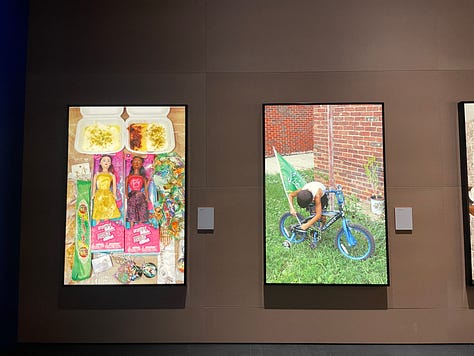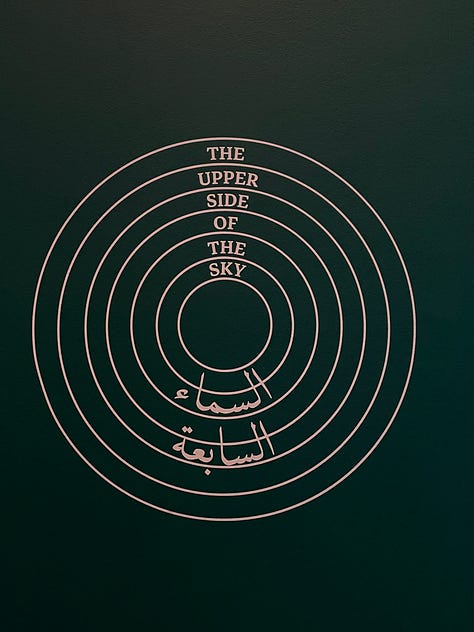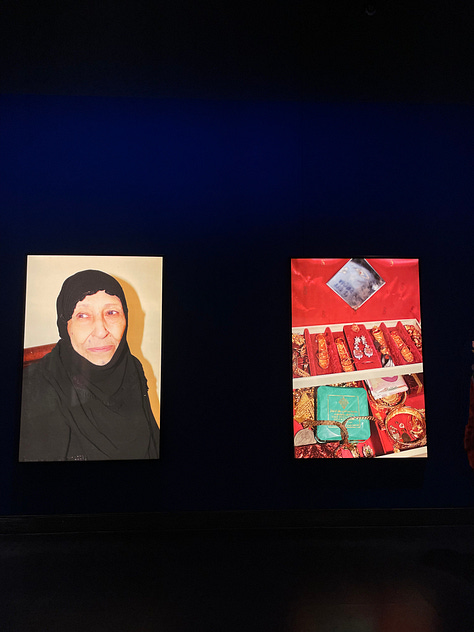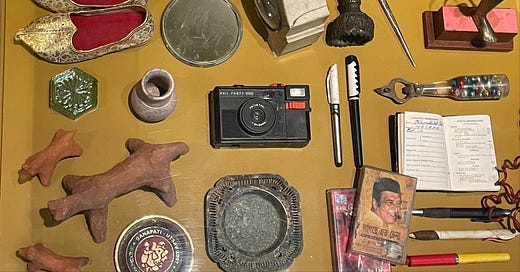Jameel Prize: Moving Images + Our V&A Late
Reviewing the Jameel Prize: Moving Images exhibition and an exciting announcement for our Friday Late at the V&A!
Welcome to the Muslim Sisterhood newsletter!
I’m so excited to kick things off this year with our first newsletter on the Jameel Prize exhibition and an announcement for Muslim Sisterhood’s Friday Late at the V&A at the end of the month (read more below !)
We’ll be using our newsletter as a platform to share reviews, interviews and recommendations, as well as sharing any of our upcoming events and opportunities. You can expect posts from myself, as well as some guest posts from our community members throughout the year, so we hope you stick around <3
With love,
Yasmin, Muslim Sisterhood Substack Editor
Jameel Prize: Moving Images
The seventh edition of the Jameel Prize examines community, and particularly shines a light on the ecological impact of climate change in the Middle East and South Asia through the lens of Moving Images. The triennial competition - a collaboration between the V&A Museum and Jameel Art since 2009 - spotlights contemporary art and design inspired by Islamic culture, history, society and ideas. This year’s installment invites us to step into the world of different communities around the world and immerse ourselves in the lived experiences of those who have been displaced from their homes or are facing the impact of the climate crisis across the Islamic world.
As you explore the exhibition, you encounter a diversity of different stories - all told in their own unique way and through different mediums. Marrim Akashi Sani’s Muharram (2024) presents a series of spontaneous photos, documenting her local Muslim community, based in Detroit. Her work explores the layered identities of a diverse Muslim community in the American Midwest: in one frame, Barbie dolls sit beside takeout boxes of sweets, jewelry and keyrings bearing the image of Imam Ali are juxtaposed with a young boy fastening a flag with Arabic text to his bike.
Sani’s work is the only set of still images in the exhibition - the rest of the exhibition unfolding through sound and moving image. Zahra Malkani presents audio in the form of sonic practices in Pakistan as a form of resistance against ecological violence. Jawa El Khash creates a virtual world that explores the ancient ruins of Palmyra in Damascus. The carefully curated exhibition invites you to sit with these different forms of media and reckon with these big challenges facing Islamic communities around the world in a really thoughtful way.



This year’s winner, Dream Your Museum (2022) by Indian artist Khandakar Ohida is wholly deserving of the prize. Based on the artist’s uncle, Khandakar Selim, the short film tells a beautiful story about a man who sees value in objects that others would often discard, challenging our perceptions of what curation can mean and what a museum could be. Offering an alternative to our traditional perceptions of a museum, Ohida’s film tells a touching story that finds beauty in the unexpected as we explore Selim’s museum in his mud home in West Bengal.
Ranging from train tickets and old pens to stamps and old telephones, Selim’s collection of more than 12,000 objects, acquired over 50 years, reflects not only his curiosity for the world but also reflects a history of colonialism and partition. Some items, which you can find displayed in the exhibition, are more traditionally beautiful or might pass as antique - such as an old telephone, or record player. Others, not so much - think, an empty perfume bottle, or old receipt. Yet, Selim manages to find meaning in all of this, asking us to rethink what we find beauty in.
As we watch Uncle Selim talk to his younger relative through the stories behind his objects, the artist overlays whimsical drawings and animations over the video, creating an aura of magic - as if the objects have a life of their own. In Uncle Selim, we might recognise some parts of our own relatives - or fragments of spaces that we have become familiar with through our own experiences. Maybe of our own fathers, uncles, grandfathers and family members who find treasure in the unexpected.
Watching the film, I was reminded of my grandfather’s tendencies to build his own collections of curiosities in his home. Whilst his collections of precious stones and wooden ducks might be slightly more curated, the stories he’s shared about his objects ignite the same passion as Selim’s. Seeing Selim’s shelves and cabinets also reminded me of some of the cabinets I’ve seen in Jakarta’s chinatown restaurants: perfectly imperfect vintage cabinets that are stuffed to the brim with things that have accumulated over the years - each item with its own untold story.
Since the film was made, Uncle Selim’s home has since been demolished - reminding us of the fragility of rural communities today. Winning the Jameel Prize will have a profound impact on Selim and his collection, enabling Ohida to create “a small room for the museum, as we didn't have any space to properly preserve the objects. We are also working on a 3D museum film, something like a magic house (a 360-degree film) since the original house was demolished.” Through this Ohida and Selim, will be able to fulfil their dreams of creating a different kind of museum and “a rural museum that could help spark cultural conversations in the village.”
Their museum offers a glimpse into the future of what museums can be - more inclusive, more nuanced and more connected to different walks of life. It sets the stage for more spaces that celebrate overlooked stories and open up more diverse conversations about art and culture - I hope that this is just the beginning.
You can visit the Jameel Prize at the V&A for free until 16 March.
Friday Late: A Thread of Light
We’re very excited to share that Muslim Sisterhood will be hosting a takeover at V&A’s Friday Late on the 28th of February inspired by the Jameel Prize! You’ll be able to see the Jameel Prize exhibition, along with a curated programme by Muslim Sisterhood across the whole museum for free.
Inspired by the works from this year’s Jameel Prize, we’ve curated a dynamic evening of art, music and storytelling featuring creatives from across the SWANA region and beyond. Through performances, films, workshops, installations and panel discussions, we’ll be celebrating how creatives reshape and envision a future for Muslim identities.
Our highlights include a DJ set by Tabideee celebrating Sudanese and Afro-Arab sounds, and a magical performance from Kairo Girl’s School.
We’ll also be hosting two panel discussions: Our first talk, Crafting Narratives: Muslim Storytelling in Film & Theatre explores authentic cultural narratives with Warda Hassan, Mohammed Zain Dada, Sabrina Ali, and Adeeb Razak, and our second panel From Cultural Heritage to Contemporary Design will feature Leen Ajlan and Shahed Saleem discussing locality, diasporic movement and reimagining cultural heritage through contemporary architecture and design.
You’ll also be able to deep dive into the WANAWAL (West Asian and North African Women’s Art Library) Archive by Êvar Hussayni, with the opportunity to explore books and materials by majority women and femme practitioners from West Asia and North Africa, engage in 3EIB’s interactive board game space, and explore photographer Zaineb Abelque’s photo series Trouvé.
You can check out the full details here and drop-in at any time between 18:30-22:00, no tickets required.
We hope that you’ll be able to come thru and can’t wait to see many of your faces there! <3 <3
HOW TO GET TO THE V&A
Address: V&A South Kensington, Cromwell Road, London, SW7 2RL
Nearest Underground stations:
South Kensington (5-minute walk)
Gloucester Road (10-minute walk)
Victoria Station (35-minute walk)
WHERE TO GO AFTER YOU’VE VISITED THE V&A
Whether you’re planning to visit the Jameel Prize exhibition this year, or just keen to explore the V&A’s collections, South Kensington has plenty of spots to choose from to feed or refresh yourself after all that culture and learning. Here are a couple of our favourite spots:
For something light & delicious: Tombo Cafe
This humble but charming Japanese cafe is the perfect spot for a lighter but delicious choice. Their diverse menu offers a variety of matchas, ice cream desserts, poke bowls and rice bowls. Our favourite? The Kyoto Kaisen poke bowl is perfect for a refreshing & umami-packed lunch.
For something comforting: Al Arez
If you’re looking for something a little heartier, we love Al Arez, a Lebanese joint known for its friendly service, authentic flavors and generous portions. Serving up all the classics from shawarma to tabbouleh, every dish is fresh, flavorful, and perfect for dining in or grabbing on the go. It’s perfect after a late night visit to the museum, when you want something warm and comforting as you digest everything that you’ve immersed into earlier in the evening.







YAAAAAAAYY